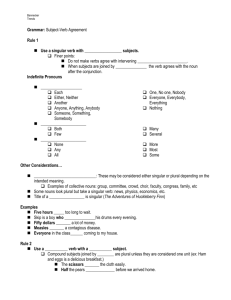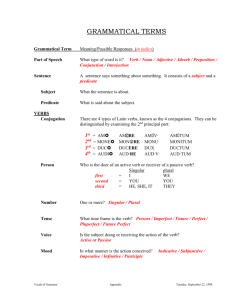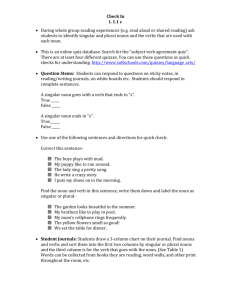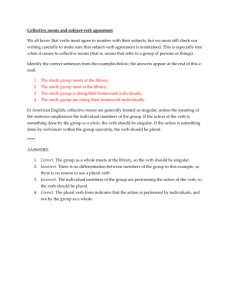Grammar Review 1: Parts of Speech & Subject
advertisement
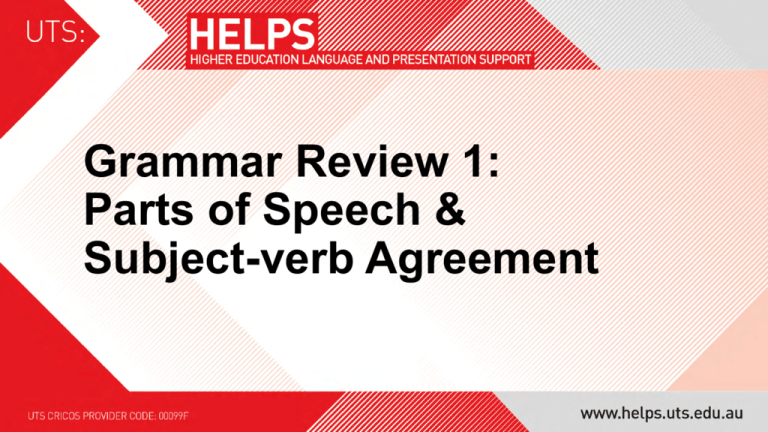
Grammar Review 1: Parts of Speech & Subject-verb Agreement Grammar review workshops 1. 2. 3. 4. Parts of speech & subject-verb agreement Verbs & reporting verbs Articles & punctuation Your suggestions Parts of speech Words must be used in their correct form according to what they are doing in the sentence. Every word in a sentence has a function or role. Misrepresenting the function or role of a word in a sentence can lead to misunderstanding. Joseph is bored versus Joseph is boring Joseph is interesting versus Joseph is interested A word being used as a subject or object must be in noun form: The company’s decision has to be respected. We have to respect the company’s decision. The company needs to make a decision. The company has to decide. The company has decided. The company is deciding between the two. A word being used to describe a noun must be in adjective form: New employees are given a corporate uniform. The corporation insists that all its employees must wear their uniforms. Critical analysis has to be exercised. The critics did not like the film. A word being used to qualify a verb must be in adverb form: The statement must be analysed critically. The critical statement must be analysed. Careful analysis must be carried out. Analysis must be carried out carefully. Parts of speech: Activity 1 Analyse the following sentences. Identify the words in each sentence that belong to the same family, and the functions of these words. These managers differ; one difference between these different managers is that they manage differently. This is a productive company; it produces many products productively and has increased productivity in its production. In the national interest, the nation will nationalise nationally. Parts of speech: Activity 2 With each group of words below, form a sentence: patient, patience, patiently lead, leading, leader, leadership strong, strongly, strength, strengthen organise, organised, organiser, organisation, organisational, organisationally Subject-verb agreement Subject-verb agreement refers to the way words or word classes are matched in terms of number. I.e. singular noun-singular verb; plural noun-plural verb. Joseph is a gorgeous person! There are two Josephs in my class, and they are both gorgeous! In order to determine if a singular verb or plural verb should be used to match the noun, it helps to know if it’s a countable noun or uncountable noun. Countable and uncountable nouns Countable and uncountable nouns: • • A countable noun is one that can be expressed in plural form (e.g. essay/essays). An uncountable noun is one that usually cannot be expressed in a plural form (e.g. coffee). Some nouns in English belong to both classes: they have both a countable (i.e. concrete and specific) and uncountable (i.e. abstract and general) meaning: I’ve had some difficulties finding relevant materials for the essay. She succeeded at university with little difficulty. The talks will take place in Building 1. I dislike idle talk. A special case of the use of uncountable nouns in a countable sense has to do with classification. Sometimes a usually uncountable noun can be understood as one item separate and distinct from other items of the same category. The nouns that function this way often denote foods and beverages. There are several Australian wines to choose from. I prefer Sumatran coffees to Columbian. We use a variety of different batters in our bakery. There is/are… In sentences beginning with There is or There are, the subject follows the verb, which agrees with what follows: There are many questions. There is a question. Collective nouns Collective nouns are words that imply more than one person, but that are considered singular as they refer to a unit/group and take a singular verb: The team runs during practice. The committee decides how to proceed. The family has a long history. Collective nouns take a plural verb when the noun is referring to individuals within the group: The government has made an important decision. The government have made an important decision. The class has a test on Friday. The class have a test on Friday. Nouns ending in ‘s’ Nouns such as mathematics, news, measles, and physics (plural in form but singular in meaning) require singular verbs: The news is on at 6 o’clock. Nouns such as scissors, tweezers, trousers, spectacles and chopsticks (plural in form and plural in meaning) require plural verbs: These scissors are dull. Those trousers are made of wool. *A pair of trousers is torn. Indefinite pronouns The words each, each one, either, neither, everyone, everybody, anybody, anyone, nobody, somebody, someone, and no-one are singular and require a singular verb: Nobody has claimed responsibility. *Everybody has to pay their taxes. *Any of the recommended books are worth reading. Compound subjects When the subject of a sentence is composed of two or more nouns (making them joint operators of the action) connected by and, use a plural verb: John and I work on the assignment together. *Bacon and eggs is on the menu. When two or more singular nouns are connected by or or nor, use a singular verb: The book or the pen is in the drawer. When a subject contains a singular noun and a plural noun joined by or or nor, the verb should agree with the part of the subject that is nearer the verb: The boy or his friends run every day. His friends or the boy runs every day. Do not be misled by a phrase (i.e. post-modifier) that comes between the subject and the verb. The verb agrees with the subject (head noun): One of the boxes is open. The team captain, as well as his players, is anxious. The book, including all the chapters in the first section, is boring. The woman with all the dogs walks down my street. Complex subjects A noun phrase can have two or more nouns within it. The verb that follows will agree with the head noun: A book of answers comes with the study guide. An amount, quantity or number thought of as a whole takes a singular verb: Six years is a long time. Three dollars is not much. Ten kilometres is too far to walk. The number of students on the course is less than last year. Expressions using the phrase number/total of depend on the meaning of the phrase: they take on a singular verb when referring to a singular quantity (i.e. a set), and plural verbs to highlight the individuals in it: A number of students do not understand the assignment question. A total of 88 students is coming. With fractions, percentages and indefinite quantifiers (all, few, many, much, some, etc.), the verb agrees with the preceding noun: Two-thirds of the task is completed. Two-thirds of his articles are peer-reviewed. Fifty percent of what he writes is undocumented. Fifty percent of the computers are iMacs. All the information is correct. All the studies are current. Much of the book seems relevant to this assignment. Many researchers depend on grants from industry. None and half of can take a singular or a plural verb, depending on whether the following noun is countable: None of the mixture is left. None of the ingredients are left. HELPS services and programs: • • Daily workshops Assignment advice • • • • • • • 15-min drop-in consultation 40-min one-to-one consultation by referral WriteNow! Writing support sessions Conversations@UTS HELPS Volunteers and Mentors Self-help resources Holiday intensive workshops Contact us Building 1, Level 3, Room 8 (opposite Tower Café and Careers Service) T: 9514 9733 E: helps@uts.edu.au W: ssu.uts.edu.au/helps


